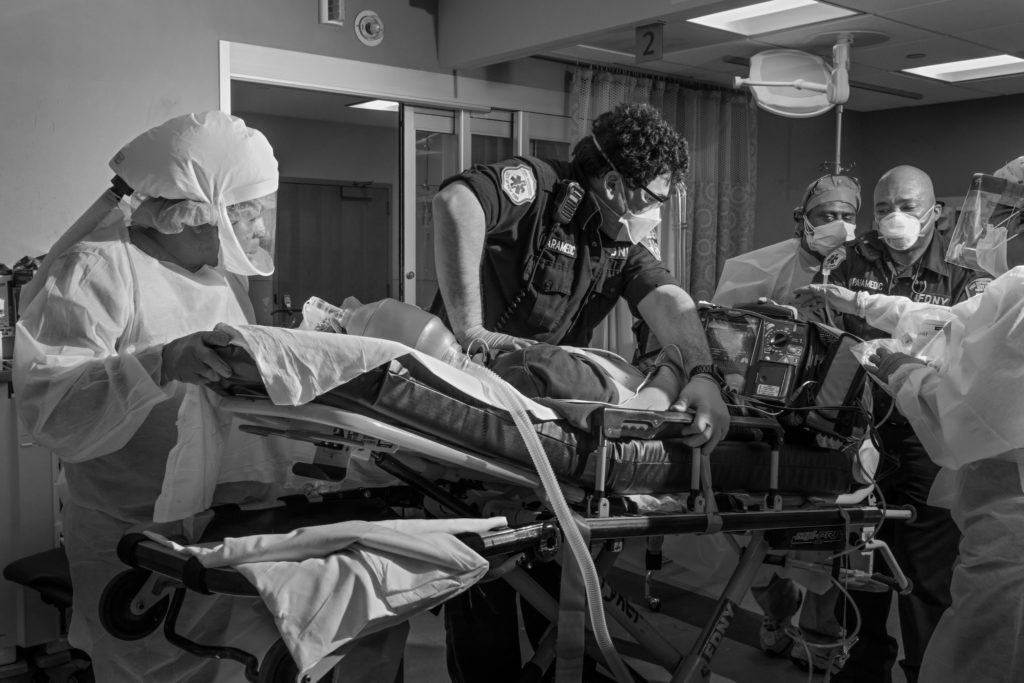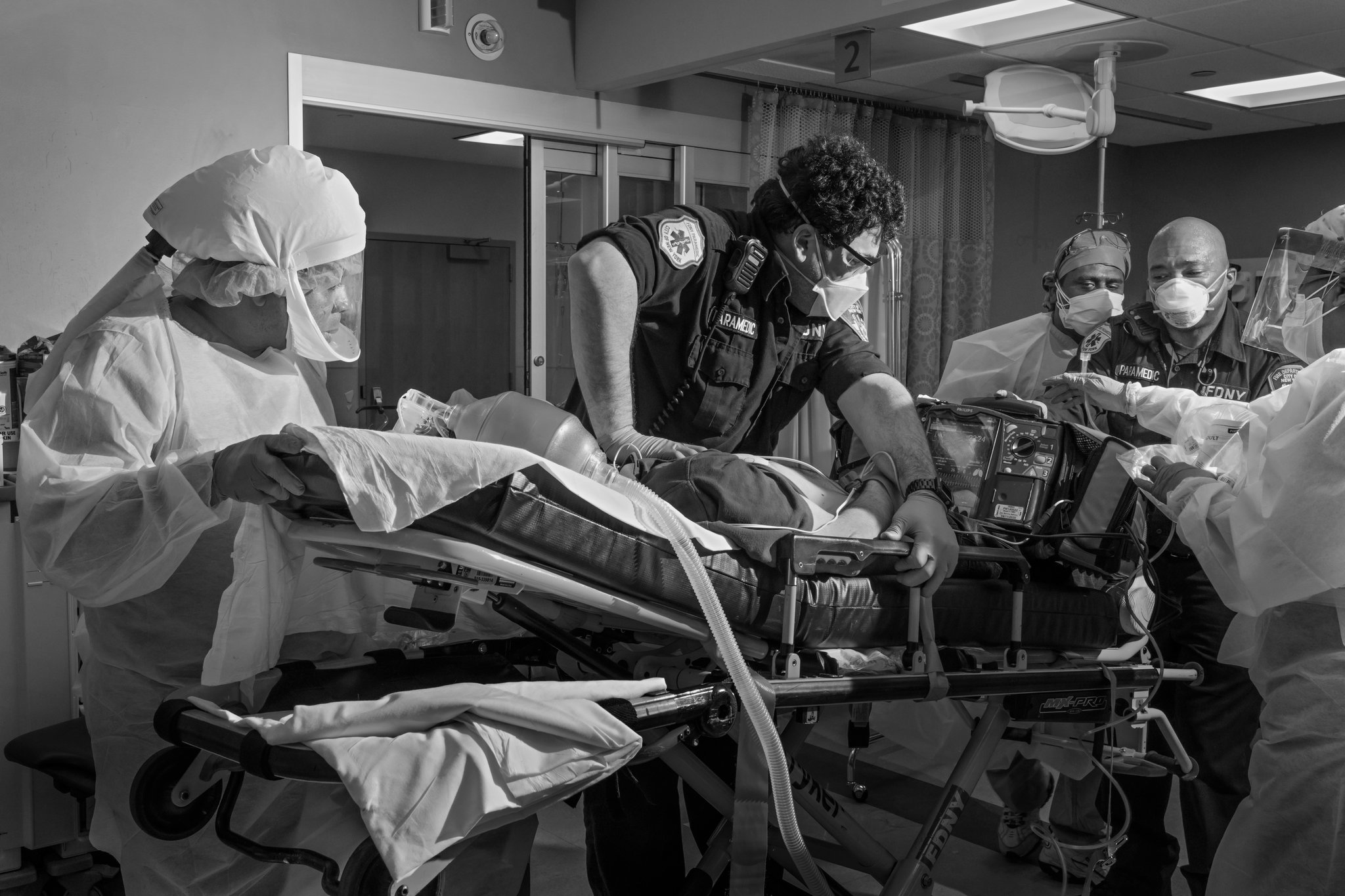
One day, people will flood sidewalks and coffee shops with grins again and tell stories about how one bat could change the world. Those tales will show a ripple of realities that Corona forced on different people, some far more devastating than others.
Reality for most Americans means staying in the confines of home with loved ones, battling the mental wrath of isolation. Others are camped behind cash registers, drive-thru windows, restaurant kitchens and anywhere deemed essential, trying to keep reality going not knowing how far the disease is from them and their families. They will hear stories from medical professionals, and realize the true reality of Covid-19 was beyond anything they could ever comprehend.
“Unfortunately, my first encounter with a covid patient resulted in pronouncing a 24 year old patient,” an Emergency Medical Technician in the New York City area told me. “As a first responder, I’m exposed to all sorts of illnesses and diseases. That’s the job we signed up for. We find people in the worst of circumstances, and at times the most exciting moments of their lives like childbirth. However, in the past few weeks it’s been a different dynamic. The war on COVID-19 is a battle like no other.
“If there’s anything I wanted to bring into perspective that most people might not have thought of, is that most first responders have contracted covid, and are still forced to work through it; because of the high demand for personnel,” he continued. “The ER should be the last place anyone should ever want to be right now and people should understand what categorizes a ER visit. It’s literally a cesspool of covid, and should you or any other loved one go to the ER for something non-critical, you in turn risk exposure and contracting covid as a result.”
Over 700,000 cases of Corona across the United States have pumped hospitals full of anarchy with medical staffers operating through a purge. Thousands of people perish as the president denounces public pleas for ventilators by doctors, donations of homemade face masks have become a necessity, workers sleep in their scrubs on desks and break-room chairs in areas that should be coated in plastic. Nurses watch as isolated fathers say their final goodbyes to their sons and daughters over the phone. With the ailing fates of mothers, brothers and sisters in the hands of doctors they barely have enough gloves. Even those not in the craters of emergency rooms face life-threatening obstacles.
“I visit patients in their homes or in nursing facilities/hospice. So I’m not necessarily on the ‘front lines’, but the thing that has been the scariest for me is the resource shortages,” said a Home Health Physician Assistant working in Los Angeles. “We couldn’t get our hands on medical grade masks until about two weeks ago, I was reusing the same disposable mask and sanitizing it every day for a couple weeks before that. It’s exhausting and stressful to abide by universal precautions in someone’s home, where you have to assume nothing is sanitized and everyone has been exposed to COVID.
“Some facilities still don’t have proper protocols for PPE and for visitors, and being in such a big city [Los Angeles], the possibilities of exposure are limitless,” she continued. “I’ve seen facilities that don’t require masks because they can’t provide enough masks. I’ve seen even more facilities wearing homemade masks, good for things like the grocery store, but in a medical setting probably don’t really help much. I wish more companies would step up and make accessible medical-grade PPE.”
The lack of Personal Protective Equipment has paramedics covering up with torn-off pieces of hospital gowns as they use their hands to flip patients over on their stomach in “swimming position” to clear their breathways because there aren’t enough rotating beds to go around. With so little still known about the disease physicians do their jobs on a trial-and-error routine, learning from each intubation while keeping in mind they can only use so much equipment to protect themselves.
“Half of my patients are positive for covid. The hardest part has been trying to limit exposure and try to not go in the rooms as much to save PPE and supplies,” said a Patient Care Technician in Acute Care Areas, working in Douglasville, GA. “Upper management is really strict on how much you use but this is hard to do if your patient requires you to be in and out of the room often. Staffing has also been a big issue and we’ve been short staffed a lot lately. It’s really draining honestly and we’re not getting extra or hazard pay either.”
Even when the shift ends for the day there’s no semblance of normality for these heroes, going home to loved ones they can’t hug and praying their touch doesn’t force onto others the nightmares they’ve witnessed first hand. While the scrubs are on, people on the sidewalk move to the other side of the street out of fear.
“People kinda treat you like you’re radioactive if you go into the stores in your scrubs,” said a Registered Nurse in Savannah, GA. “I went to get coffee after work one morning and there was a couple I could overhear saying they have to leave ASAP because he’s probably infected and spreading it.”
The sandstorm of Covid-19 will leave behind deep shards of residue in everybody, some the size of wedding rings, others further than baseball bats. They will leave scars of depression and reform the outline of life as we understand it. At the end we will live to tell the story, encapsulated with the valor of those in this article and the countless others who serve for the people’s right to live.
You may also like
-
UWG’s Ingram Library Hosts Pop-Up Study Spot to Help Students Prepare for Finals Week
-
UWG Offers Mental Health Support And Academic Services To Maintain Student Success During Finals Week
-
UWG Alumnus Shares His Experience Exploring the Underground Flood Channels of Las Vegas
-
Georgia Students Simulate the Struggles of Dementia
-
UWG PR Students Score a Georgia Power Tour at Atlanta Corporate Office
